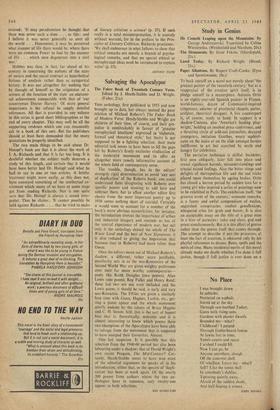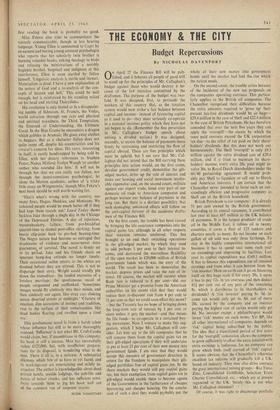Study in Genius
He Cometh Leaping upon the Mountains. By George Andrzeyevski. Translated by Celina Wieniewska. (Weidenfeld and Nicolson, 21s.) Paper Albatross, By Rupert Croft-Cooke. (Eyre and Spottiswoode, 18s.) To back oneself on a novel not merely about 'the greatest painter of the twentieth century,' but as a reappraisal of the creative spirit itself, is to pledge oneself to a masterpiece. Antonio Ortiz is an eighty-year-old Spanish painter in France, world-famous, doyen of Communist-inspired congresses, adorner of provincial chapels, potter, sculptor, theatrical designer. A live counterpart is, of course, ready to hand. In support is a shadow-Cocteau, also 'America's leading play- wright,' holding an insolent press conference, and a thrusting circle of sold-out journalists, decayed youngsters, imitation Goethes, weary sophisti- cates on the make or on the slide amongst hordes indifferent to art but scorched by myth and hungry for celebrities.
The narrative technique is skilful. Incidents, first seen obliquely, later fall into place and reveal significant hatreds, misunderstandings and crucial mixed feelings. Also the bitter stings and delights of metropolitan life and the sad tricks played upon themselves by ageing bodies. Ortiz has closed a barren period by sudden love for a young girl who inspired a series of paintings now to be exhibited in Paris. The exhibition itself, 'the greatest event of the century,' someone remarks, is a funny and awful compendium of malice, anguished conspiracies, studied genuflexions, whispered cries for grub and booze. It is also an acceptable essay on the role of a great man in a hive of parasites: ruler and slave, god and priest simultaneously. But it is this effect of genius rather than the genius itself that comes through.. The attempt to describe if not the processes, .at least the fact of creation, is obscured only by his playful references to drums, flutes, spells and the. mists of time. Many incidental merits of this novel already make me doubt whether I've done it full justice, though if full justice is ever done on a
first reading the book is probably no good.
Miss Fek-ete also tries to communicate the scarcely communicable, though in less bracing language. Young Ellen is summoned to Capri by an earnest and boring young amateur psychologist who reports that her scholarly twin brother is burning valuable books, talking theology to birds and refusing the ministrations of a notably hygienic brothel. Sceptical and indignant at this interference, Ellen is soon startled by Julian himself. 'Linguistic analysis is sterile and inexact. Materialism is dead. I have a new explanation of the nature of God and a re-analysis of the con- cepts of heaven and hell.' This could be well enough, but is reinforced by his standing naked on his head and reciting Thucydides.
His revelation is only hinted at in a disappoint- ing jumble of Ikhnaton, St. Francis, the Vedas, world salvation through sun rays and physical and spiritual nakedness, the Third Temptation, the Emerald of Understanding, the Ultimate Good. In the Blue Grotto he encounters a dragon which gabbles in Aramaic. He gives away clothes to beggars. But as a character Julian does not quite come off, despite his eccentricities and his creator's concern for ideas. His story, interesting in itself, is surely handicapped by being told by Ellen, with her dreary references to Stephen Potter, Nancy Mitford, Evelyn Waugh 'or another author who sounded like him.' It will not be through her that we can really test Julian, nor through the incest-conscious psychologist, let alone the Merton academic, author of 'a tricky little essay on Wittgenstein,' though Miss Fekete's next book should be well worth waiting for.
'That's what's wrong with the country, too many Jews, Dagos, Hunkies, and Mexicans. We coloured people would be much better off if they had kept them rascals out.' Land Today shows feckless Jake through a single day in the Chicago of the Depressed Thirties. A day of injustices, mountebankery, failure, from pre-breakfast quarrel-time to dismal post-office clerking; from hectic clip-joint back to pre-bed beating-time. The Negro nature had become so outraged that daydreams of violence and never-never were guarantees of survival. The novel is firmly set in its period. Jake and his friends share an ignorant hang-dog attitude no longer timely. Their occasional sullen retorts to the whites are doomed before they are uttered. This is not to disparage their story. Wright could vividly pin down the immediate: the loaded moments of a loveless marriage; the spontaneous recoil of people outgunned and outflanked. 'Sometimes images would flit aimlessly into their minds, and then aimlessly out again, like stray cats slinking across deserted streets at midnight.' Clusters of emotion, dim accretions of instinct and tradition, rose to the surface of their consciousness like dead bodies floating and swollen upon a tired sea.'
This posthumous novel is from a harsh talent whose influence has still to be more thoroughly assessed. 'Influence' is not what Mr. Croft-Cooke would claim, but, if unambitious in this company, his book is still a success. Max has successfully stolen 1125,000, but, with insufficient prepara- tions for its disposal, is wondering what to do next. There it all is, in a suitcase. A substantial dilemma which few of us have as yet faced, and its workings-out are entertaining and mildly in- structive. The author is knowledgeable about dead private hotels, seaside lodgings, the pub-life and Patois of minor crooks, and has sufficient sensi- tivity towards them to jog his book well out of the common run of suspense stories.
PETER VANSITTART































 Previous page
Previous page